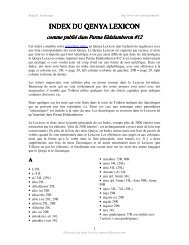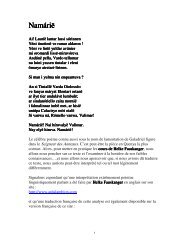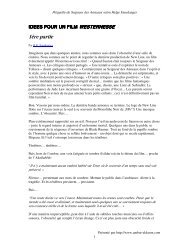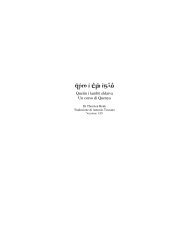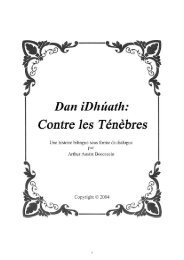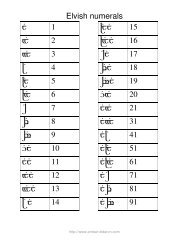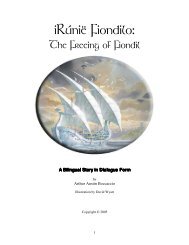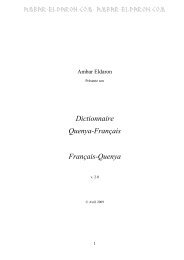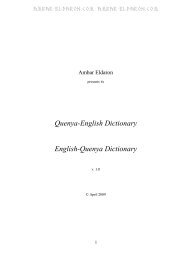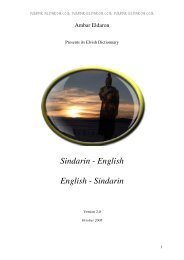Quenya Reverse Wordlist - Ambar Eldaron
Quenya Reverse Wordlist - Ambar Eldaron
Quenya Reverse Wordlist - Ambar Eldaron
Create successful ePaper yourself
Turn your PDF publications into a flip-book with our unique Google optimized e-Paper software.
Helge K. Fauskanger http://www.uib.no/People/hnohf/<br />
Ainur 'pagan' " (LT1:248). Ainulindalë "Music of the<br />
Ainur" (SA:lin #2), the First History (WJ:406), the<br />
Song of Creation (AYAN)<br />
uniaf fainu- "release" (LT1:250)<br />
upalh hlapu- "blow; fly or stream in the<br />
wind", participle hlápula "blowing" in Markirya<br />
úR Rú "Drûg", Rúatan pl. Rúatani<br />
"Drúedain" (UT:385)<br />
urat taru "horn" (LT2:337, 347; mature<br />
<strong>Quenya</strong> tarca)<br />
uray yaru "gloom, blight" (GL:37)<br />
urE Eru "the One", God, a name reserved<br />
for the most solemn occasions (WJ:402), genitive<br />
Eruo (MR:329).<br />
ureh heru- "to rule" (LT1:272; rather tur- in<br />
mature <strong>Quenya</strong>)<br />
ureh heru (hér-) "lord, master" (PM:210,<br />
KHER, LT1:272); Letters:283 gives hér (heru);<br />
heruion evidently a gen.pl. of heru "lord": *"of the<br />
lords" (SD:290);<br />
urev veru "husband and wife, married pair"<br />
(BES)<br />
urífif fifíru- is evidently the frequentative<br />
(see sisíla-) form of fir-; according to MC:223 it<br />
means "slowly fade away"; participle fifírula in<br />
Markirya (translated "fading")<br />
urom moru- "to hide" (LT1:261)<br />
urrun nurru- "murmur, grumble" (cf.<br />
"Qenya" núru-); participle nurrula in Markirya,<br />
changed to nurrua, perhaps a kind of verbal adjective<br />
of the same meaning (translated "mumbling" in<br />
MC:215)<br />
uru uru "fire" (LT1:271)<br />
uruc curu "skill" in Curufin, Curufinwë,<br />
Curunir (SA:curu). In early "Qenya", this word (spelt<br />
kuru) was glossed "magic, wizardry" (LT1:269)<br />
uruf furu "a lie" (LT2:340, GL:36)<br />
urum muru- "to slumber" (LT1:261)<br />
65<br />
urún núru- "growl (of dogs), grumble"<br />
(LT1:263). Perhaps replaced by nurru- (q.v.) in<br />
mature <strong>Quenya</strong>.<br />
urun nuru, Nuru "death, Death" (ÑGUR).<br />
This would represent earlier *ñuru and should be<br />
spelt accordingly in Tengwar writing. When<br />
personalized, Nuru refers to Mandos. Cf.<br />
Nurufantur.<br />
urús súru "wind" (MC:213, 216, 220; this is<br />
"Qenya"; mature <strong>Quenya</strong> has súrë)<br />
urut turu- "kindle" (LT1:270; rather tinta-<br />
in mature <strong>Quenya</strong>)<br />
urut turu "wood" (properly firewood, but<br />
used of wood in general) (LT1:270)<br />
uruyt tyuru- "to 'turn' milk, make cheese"<br />
(QL:50, cf. GL:28)<br />
ús sú "noise of wind" (LT1:266; "Qenya"<br />
spelling sû)<br />
utul lutu- "flow, float" (LT1:249)<br />
uvul luvu- "lower, brood" (LT1:259)<br />
uvut tuvu- "receive" (GL:71)<br />
uynataf fatanyu "hell" (GL:51)<br />
val lav- (1) "lick", pa.t. #lávë in undulávë,<br />
see undu (Nam); 1. person aorist lavin "I lick" in the<br />
Etymologies (LAB)<br />
val lav- (2) "yield, allow, grant" (DAB)<br />
vayt tyav- "taste" (1. pers. aorist tyavin "I<br />
taste") (KYAB)<br />
vut #tuv- "find", perfect utúvië "has found"<br />
in Aragorn's exclamation when he found the sapling<br />
of the White Tree: utúvienyes "I have found it"<br />
(utúvie-nye-s "have found-I-it") (LotR3:VI ch. 5)<br />
wac caw- "bow" ("k") (1. pers aorist cawin<br />
"I bow") (LT1:257; cf. cauka, cauko)<br />
Presented by http://www.ambar-eldaron.com



